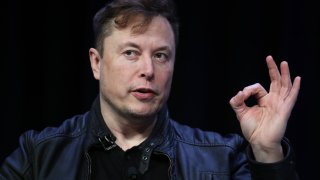
- While still a hazy concept, Web3, has been hailed by proponents as a decentralized version of the internet based on blockchain, the technology behind many major cryptocurrencies and nonfungible tokens, or NFTs.
- A plethora of entrepreneurs around the world are trying to design and build the technologies and protocols that would support Web3.
- Elon Musk thinks Web3 is more of a "marketing buzzword" than a reality, while Jack Dorsey argues that Web3 will ultimately end up being owned by venture capitalists.
Tesla CEO Elon Musk and Twitter co-founder Jack Dorsey — two of the world's best-known tech billionaires — have been voicing their thoughts on a hypothetical new iteration of the internet this week: "Web3".
While still a hazy concept, Web3, or Web 3.0, has been hailed by proponents as a decentralized version of the internet based on blockchain, the technology behind many major cryptocurrencies and nonfungible tokens, or NFTs. A plethora of entrepreneurs around the world are trying to design and build the technologies and protocols that would support Web3.
Get New England news, weather forecasts and entertainment stories to your inbox. Sign up for NECN newsletters.
Advocates of Web3, which would follow Web1 and Web2, argue that today's online platforms are too centralized and controlled by a handful of large internet companies, like Amazon, Apple, Alphabet and Facebook parent company Meta. These companies have amassed vast quantities of data and content that's been shared on the internet.
On Sunday, Musk tweeted a TikTok of an interview about the internet between Bill Gates and David Letterman in 1995, asking: "Given the almost unimaginable nature of the present, what will the future be?"
He followed up saying: "I'm not suggesting web3 is real — seems more like a marketing buzzword than reality right now — just wondering what the future will be like in 10, 20 or 30 years. 2051 sounds crazy futuristic!"
Money Report
A day later, Musk followed up saying: "Has anyone seen web3? I can't find it."
To the annoyance of Web3 fans, Dorsey hinted that it's already under the control of venture capital firm Andreessen Horowitz, an early Facebook backer and a Web3 advocate.
"It's somewhere between a and z," said Dorsey, who stepped down as Twitter CEO last month to focus on his payments start-up, Block, formerly Square.
Web3's army of supporters ultimately wants to see the power of the internet put in the hands of the people, not VCs. They believe it's too big and important for a small number of companies or investors to manage.
Today the internet is vital to the global economy and plays a role in powering everything from nuclear facilities to hospitals.
But Dorsey believes that VCs and their limited partners will be the ones who ultimately end up owning Web3. "It will never escape their incentives," he tweeted, causing a backlash from fans of the concept. "It's ultimately a centralized entity with a different label."
His tweet received over 26,500 likes and 5,900 retweets in nine hours, with some saying he was "dead wrong" or that they highly disagreed.
In a subsequent tweet late Tuesday, Dorsey followed up saying that he thinks the VCs are the problem, not the people. The entrepreneur also retweeted a meme that depicts how VCs stand to get rich from Web3.
Beyond the internet, there's also a big push to decentralize finance (DeFi) that is being led by cryptocurrency entrepreneurs and fans of coins like bitcoin and ether.
A similar movement is happening in the energy industry. All energy used to be generated by a select few companies and then sold to the masses. Now some people are taking control of their own energy needs and making it more decentralized.
— CNBC's Ryan Browne contributed to this report.






